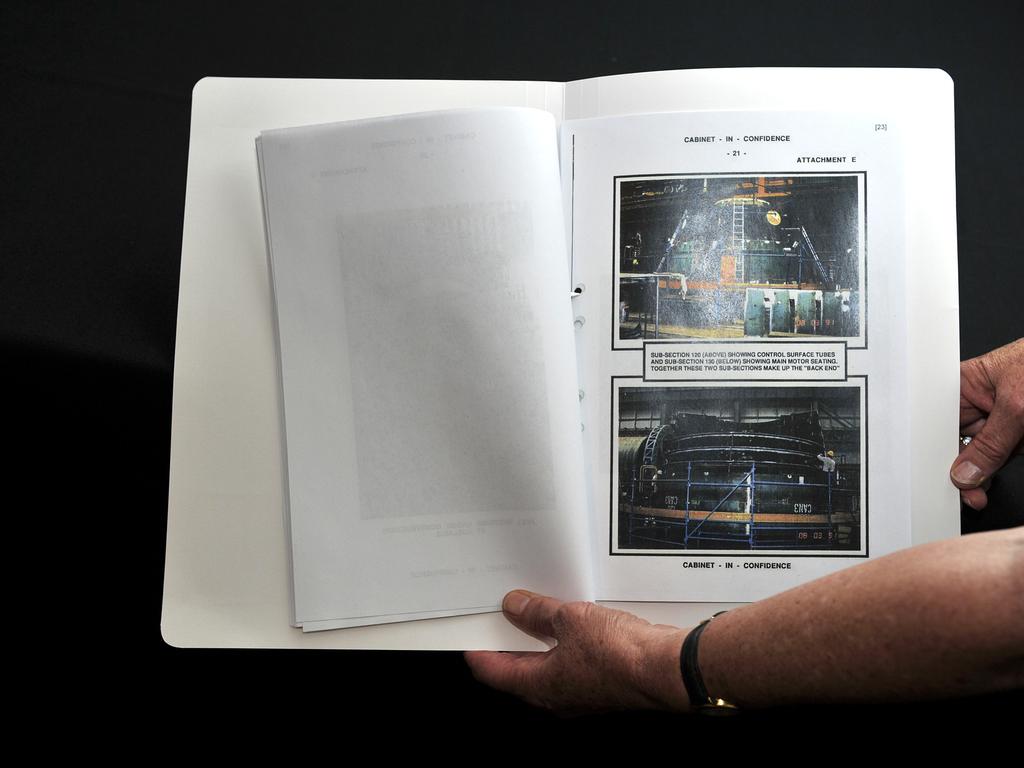Defacing the record – how Archives black out history

When it finally cracked open its vault this month to release the correspondence between the Palace and six other governors-general, the Archives cut out whole documents or applied the black ink liberally to redact particular passages in the letters.
This would be fair enough if they revealed matters affecting Australia’s current national security or the identity of Australia’s secret agents, but this is not the case.
Mostly, the redactions seem to have occurred to protect the government or individuals from embarrassment – yet this is not a legal ground for preventing public access to these documents.
The problem with challenging redactions in documents held by the Archives is that the challenger is always arguing blindfolded. It is hard to point out how a redaction fails to satisfy the legal requirements if one doesn’t know what is in the redacted material.
Sometimes the Archives slips up, and the redacted part of one letter has not been redacted in a draft of the same letter, or in a separately released file.
On such occasions, this frequently shows that the power to redact has been used inappropriately, as the material redacted does not fall squarely within one of the listed grounds of exemption in the Act. But there is no point in anyone going to the effort to challenge the redaction if they already know what the documents says.
How do the redactions and exclusions made by the Archives to the most recent release of vice-regal correspondence stack up? Are they justified?
Here are two examples where the redactions seem to be dubious.
The first concerns a letter by then governor-general Sir Paul Hasluck to the Palace on September 1, 1972, about the grant of Honours. About half of the letter is blacked out, but what is left concerns the issue of whether Australians should be appointed to the British House of Lords as “life peers”. Hasluck describes how he counselled the prime minister Billy McMahon against this. He could not see how it was appropriate for Australians to be involved in making British laws and he thought that general public sentiment in Australia was against it. He also pointed out that the British prime minister had to recommend such honours, because they involve appointment to the British parliament.

What, then, is in the blacked out paragraphs? We can take a pretty good guess, because Hasluck wrote about exactly the same issue, using almost the same words, in a record of his discussion with the prime minister around the same date. It is in a separate file released some years ago without redactions by the National Archives. The missing parts are therefore likely to contain discussion of those who were pressuring McMahon to recommend them for life peerages. They were Sir Henry Bolte, the Victorian premier, who wanted to be “Baron Bolte”, and Sir Alick Downer, Australia’s high commissioner in London in 1972, who wanted to become a Lord.
According to Hasluck, McMahon “revealed with unusual frankness that Bolte kept on asking for a peerage” and that he dared not refuse it to him because he badly needed Bolte’s support. Failure “would make a determined enemy out of Bolte”. Hasluck also later claimed that Downer had been lobbying both the British prime minister and McMahon for a life peerage and was “very bitter” when it did not come through. McMahon had tried but “got a dusty answer” from No 10 Downing Street. McMahon then favoured a life peerage for Sir Robert Menzies, but lost office before he could pursue it further.
This material might be embarrassing, both for those who were allegedly campaigning for honours for themselves, and for governments because it shows how honours were used not only to buy political support but also to buy-off people to prevent political attacks. This, however, is not a ground for refusing access to a document that is 50 years old and concerns people who died long ago.
According to the Archives’ determination, the paragraphs could be redacted because they fell into an exception for information or matter concerning the “business or professional affairs of a person”, the disclosure of which “would, or could reasonably be expected to, unreasonably affect that person adversely in respect of his lawful business or professional affairs”.
Bolte and Downer, both now dead, could hardly be adversely affected with respect to their business or professional affairs. Is the Archives really asserting that the Queen might be adversely affected in respect of her business or professional affairs if there is a discussion in a letter of 50 years ago about whether Australians should be granted life peerages?
The Queen acts upon ministerial advice in granting life peerages – she does not have a choice. It is a long stretch to suggest that the grant of honours upon ministerial advice concerns the Queen’s “business or professional affairs”, and it is beyond comprehension that the disclosure of a discussion of honours from 50 years ago could unreasonably affect her adversely in respect of her business or professional affairs today.
Further, the material about Bolte, Downer and the lobbying for peerages is publicly available in digital documents on the Archives’ own website and is also discussed in a newspaper opinion piece published in 2014, which is still accessible on the internet. Redactions can only be applied if the material involved remains confidential. Unless there is something quite surprising in the letter, it seems unlikely that the redactions have been properly applied.

A second example concerns the calling out of the troops after the Hilton bombing in 1978. Then governor-general Sir Zelman Cowen agreed to call out the troops to protect visiting heads of state during a Commonwealth Heads of Government Regional Meeting, as they moved to Bowral for further talks after the bombing. The deployment of troops around Bowral has sometimes been called the “siege of Bowral”.
While the governor-general acted immediately, as advised in a meeting of the Federal Executive Council, he later requested legal advice from the Crown Law Officers (the attorney-general and the solicitor-general) about the legal basis for making the order and what powers and authorities could be exercised by the troops who had been called out. That advice was provided two weeks later, and the governor-general sent a copy to the Palace, after the Queen’s private secretary had expressed interest in the issue.
The Archives removed the copy of the advice in its entirety from the released files. In doing so it relied on an exemption for privileged legal documents where disclosure would be contrary to the public interest. While it is certainly a legal opinion which would have been privileged at the time it was made, is it really in the public interest to keep it secret 44 years later? The Archives claims that the information contained in the opinion “continues to be sensitive despite the passage of time and … has enduring confidentiality”. It asserts that public interest in its release is outweighed by the need to protect it due to “ongoing sensitivities”. From experience, “ongoing sensitivities” is the go-to clause for those who cannot provide a rational justification for their actions.
In this case, I already have a copy of the full opinion, so I don’t have to guess its contents when assessing the determination made by the National Archives. Is the issue still sensitive? Yes – the callout of the Australian Defence Force to support civil society during the 2019 bushfires and the 2020-22 pandemic remains legally controversial. But this 1978 opinion would have no more than historical relevance to the issue for three reasons.
First, the 1978 opinion is based on provisions of the Defence Act which have long since changed. There are now specific provisions in that Act which deal with calling out the troops to deal with internal violence within Australia. Second, the jurisprudence relied upon has also changed. The High Court has in more recent times interpreted the Commonwealth’s defence power more broadly to deal with acts of terrorism within Australia. Third, the 1978 callout was quite different to the sensitive issues of today, because it involved a response to violence rather than nonviolent crises such as bushfires and pandemics, to which different authorities apply.
The interesting part of the opinion concerned the powers of the troops when called out. Could they use their weapons and exercise force?
The Crown Law Officers admitted that there was little judicial authority on the issue. They drew on general principles from British cases to conclude that the soldiers were in no different position from others and could not use more force than is reasonably necessary in the circumstances. This is consistent with the view currently taken by the government in relation to callouts during the bushfires and the pandemic. The Minister for Defence announced in 2020 that no coercive powers had been conferred upon ADF officers who had been called out. The 1978 opinion would not undermine that position.

It is therefore unclear what the enduring confidentiality of the opinion could be. Its release might be a bit embarrassing, as the reasoning given in the opinion is weak in places. Indeed, the governor-general was not terribly impressed by it, as he noted in the letters. The opinion showed why legislative change was needed to give clearer powers to deal with such incidents. But such change has since occurred. The opinion is an interesting historical record – no more.
If the Archives, and the public servants in the Attorney-General’s Department who advise it on such matters, are terribly worried that the High Court might rely on such opinions, if revealed, when dealing with current controversies, then that cat escaped the bag decades ago. The 1978 opinion, along with many others, has been sitting in bound volumes in the High Court Library for a long time. There seem to be no good reasons why historians and others should be denied access to it.
In interviews upon his retirement, the outgoing head of the Archives, David Fricker, spoke about its proud record of providing open access to documents to researchers. Most of them probably, like me, choked on their muesli while reading that over breakfast.
It would be nice to believe that the Archives was staunchly standing up for open access, rejecting the weak and self-serving arguments of bureaucrats who seek enduring secrecy for embarrassing documents and blanket exclusions for categories of documents, such as legal opinions, without any genuine assessment of the public interest. I hope they do.
But the more depressing truth is likely to be that the understaffed and harried workers in the Archives bend to the will of the bureaucrats who offer up dubious grounds for secrecy so as to avoid responsibility for anything controversial seeing the light of day.
How often, one wonders, has the Archives ever rejected the public service advice it receives and released the documents regardless? Failure to do so has a heavy cost. It results in a historical record stained with the black ink of redaction that obliterates accuracy and any chance of understanding the truth.
Anne Twomey is a Professor of Constitutional Law at the University of Sydney






The National Archives was sufficiently embarrassed by its High Court defeat over maintaining the secrecy of Sir John Kerr’s letters with the Palace that it released them in full without redacting any of them. Unfortunately, the sting of its embarrassment has been numbed by the passage of time.